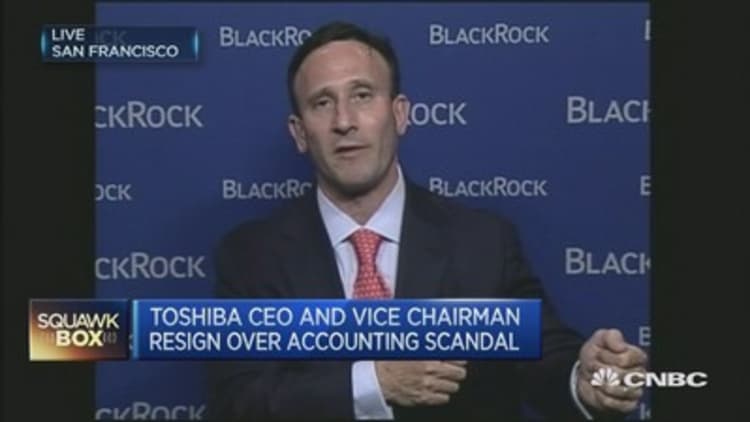Bank of Japan Governor Haruhiko Kuroda may have dismissed the chances of further monetary easing on Tuesday, but his remarks seemingly fell on deaf ears as strategists continue to bet on stimulus as early as October.
The former Asian Development Bank president said he expected Japan's inflation rate to accelerate considerably and finally hit the central bank's target of 2 percent in the first half of fiscal 2016. This improvement in price pressures makes quantitative easing (QE) unnecessary at this time, he warned.
But nobody seems to believe him.
"Kuroda has made these type of comments before, so we're not too taking it too seriously. Instead of rhetoric, fundamentals are more important and we're still expecting QE in October, especially in the wake of recent China weakness," said Saktiandi Supaat, Maybank's head of global FX strategy, in a phone interview.
Read MoreJapan's economic transformation: Are we there yet?
Existing data doesn't support Kuroda's perspective, said Tomoya Masanao, managing director of PIMCO's Tokyo office, in a Wednesday report. "Based on the seemingly long distance from the current inflation rate to the target level of 2 percent, one could simply argue that the BOJ should ease more."
Inflation, measured as CPI excluding fresh food, rose a mere 0.1 percent on year in May after spiking 3.4 percent the previous year.
And don't forget about external circumstances either.
"China is in a secular economic slowdown amid deleveraging, which is a powerful external headwind to Japan that requires accommodative policy," Masanao added. "Going forward, any major shock (for instance, an equity sell-off or currency appreciation) deemed significant enough to depress inflation expectations would likely be a trigger for the BOJ to ease further."

Ben Collett, head for Japan and Asian equities at Sunrise Brokers, also expressed skepticism.
"The issue of inflation in our view is going to equal interest rates and interest rates aren't a favorable scenario for Japan's cash flow. Interest rate payments of 2 percent are going to cripple the economy, so I'm very confused [by Kuroda's comments]," he said.
To be sure, the central bank chief, or "Helicopter Haruhiko" as he's referred to in local media, has at least one believer left.
"Tuesday's remarks confirm that the BOJ is done [with easing] for now," said Kathy Lien, managing director of FX strategy for BK Asset Management, in a note. "Some analysts had been looking for the QE program to be increased in 2015, but given Kuroda's latest comments and the tone of the latest BOJ minutes, this possibility is becoming less likely."
Minutes from the June policy meeting revealed that some BOJ board members believed the effects of quantitative and qualitative easing (QQE) were diminishing seeing as long-term interest rates temporarily rose to a 0.5 to 0.6 percent range.
What this means for markets
Kuroda's comments should see the yen strengthen, according to Lien, who's looking to buy around 122.75 per dollar. The currency hit a six-week low at 124.48 on Tuesday, but strengthened to under 124 during the Wednesday session.
Read MoreYen in focus as Nikkei nears 18-year high
But many traders are still pricing in more depreciation on expectations for October easing. Maybank's Supaat is anticipating the safe-haven currency to close out the year around 128 per dollar, while Sunrise Brokers' Collett is especially bearish.
"Japan's natural proclivity is to deflate, giving the population growth and demographics. The BOJ is committed to doing whatever it takes, which is why I think the yen will soon decline to around 140 and then eventually breach the 200 level," said Collett.
A weaker currency has traditionally been the catalyst for stock market gains, but regardless of monetary stimulus or the yen, Japanese equities are still a buy, according to BlackRock.
"How Japan has performed year-to-date has been different from previous years, in that the advance in stocks which have done very well is not on the back of a dramatically weaker yen," said Russ Koesterich, the firm's global chief investment strategist. "Even if QE is held at current levels and the yen is stable against the dollar, we still think Japanese equities can perform well."

